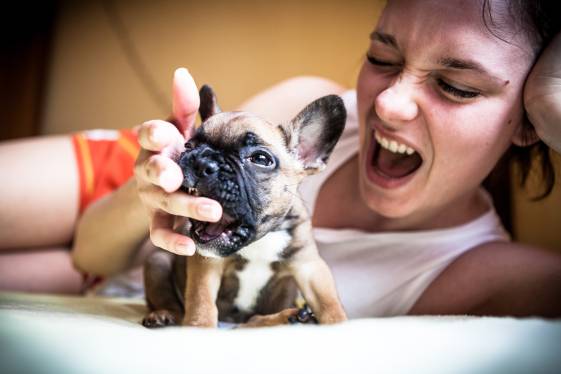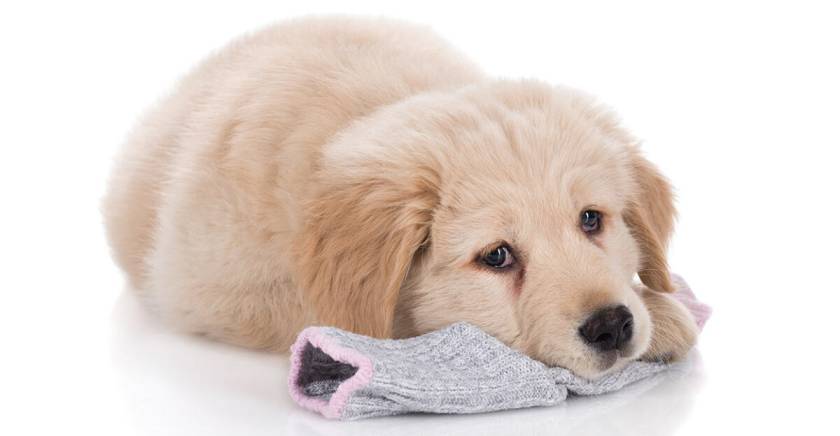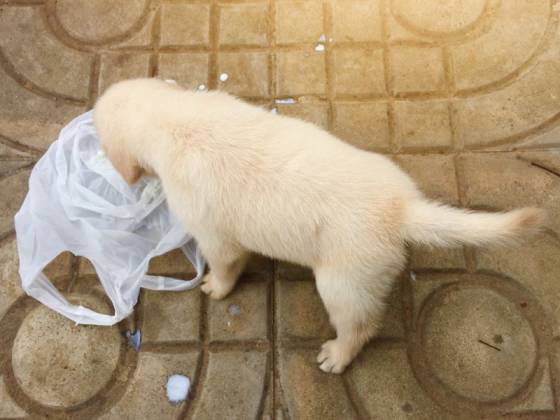Connect with a verified veterinarian in minutes. Licensed vets are available 24/7 to answer your questions. No need to worry about your furry family member.
Puppies are one of the most adorable things in the world! Your heart can’t help but melt when a puppy looks at you with his big, round eyes! While puppies are the most adorable things on the planet, they can also be very bitey!
Puppies have a tendency to bite; they use their mouths to explore the world around them. What’s more, puppies are also teething. During the teething period, a puppy’s gums may be pretty painful. So, the puppy turns to gnawing and biting on everything and everyone as a way to relieve that pain.
As puppies go through their biting stage, they may even decide that you and your family are prime targets for their teeth! A puppy may chew on your hands and fingers, arms & legs, clothing, and belongings. It looks cute, but it doesn’t feel cute. And it’s certainly not a cute behavior when you find the puppy’s chewed up your expensive hiking boots!
So, what can you do to stop your puppy from biting? That’s what we’ll review in this article! If you have a problem puppy that’s determined to bite, one or a combination of solutions in this article may get him to stop!
Considerations on Puppy Biting
Remember that puppies are going through a time of growth and exploration. They will use their mouths and teeth to explore their new world. Puppies also tend to bite when they’re teething. But there are also some other things to keep in mind about puppy bites!
Puppies tend to play very hard with their brothers and sisters, which includes using their teeth to grab, bite, and more! In addition, if a puppy is biting and playing hard, it could be a sign the puppy has been taken away from his littermates and mother at too young an age.
Littermates tend to play hard together. They bite, run, bark, growl, pounce, and more. This is normal behavior. While a litter of puppies is playing, you’ll probably notice that one of them will cry out and leave the group for a time. This is how puppies learn how not to bite too hard. So, if your puppy is truly bad about biting, he may have left his litter too soon.
Some dog breeds also use their teeth for special purposes. You may be wondering, “What special purposes?” Well, for instance, herding dogs use their teeth to help nip at cattle that are not responding correctly. A herding dog may run after a cow that’s trying to go in its own direction rather than follow the herd.
Then there are dogs that pick up and carry things such as newspapers, shoes, and more. Retrievers are the guilty party here!
It helps to keep these things in mind when dealing with a biting puppy. The puppy may naturally be nipping and biting at things. However, it’s still necessary to train him to behave properly. This is the perfect lead into our next section!
What Not to Do with a Biting Puppy
Here are some additional considerations; however, these deal with what not to do with a biting puppy!
First, it’s best not to use physical punishment on your puppy. Doing so could traumatize the poor thing and could even make him act out more. Physical punishment only makes a puppy (or dog) more afraid and stressed, which can reinforce the unwanted behavior.
Next, never use any physical method to keep your puppy from biting. For instance, never muzzle them, hold them on their back, or squeeze the puppy’s mouth shut. Again, these are methods that can scare and cause a great deal of stress in a puppy.
Fear and aggression are never the right answer to correct a puppy, dog, or any other animal. Such actions are cruel and abusive. We do not condone any type of physical punishment to a puppy or any other animal. There are much better, proper ways to get your puppy to stop biting.

Review symptoms, medications & behavior to keep your pets healthy with a Vet Online in just minutes.
Ask a Vet Live NowHow to Teach a Puppy Not to Bite
Now we’re ready to look at some methods you can use to help your puppy learn not to bite! Let’s get started!
1). Don’t Let Your Puppy Bite You
This one’s a little challenging. How can you play with your puppy without him biting you? Well, think of it this way. As you play with your puppy, he’s learning a lot. When you two play, and you allow him to bite, the puppy will think this behavior is acceptable.
As a result, the puppy will grow into an adult dog that thinks biting is a part of playing. You want to avoid this at all costs. Your puppy should never bite you or anyone else.
So, as you play with your puppy, tell him, “No,” every time he bites or even puts his teeth on you. He should be taught that even putting teeth on a human is unacceptable.
2). Give Your Puppy Toys!
Puppies love to play with just about anything! You can rest assured that your puppy will think he’s in heaven if he has plenty of toys to play with and chew on! You can use toys to redirect your dog’s biting habits, too!
When your puppy is biting you, then remove your hand (or another body part) from the puppy’s mouth. Instead, offer him one of his favorite toys.
Choose toys that are safe for your puppy. They should have no small parts that can be chewed off. Puppies love a variety of textures to chew on, too. So, try to find toys that offer a rough surface to chew on. These are great for puppies who are teething and biting. You might even be able to find a puppy teething ring!
Just be sure to redirect the puppy from chewing/biting on you or something else by giving him a puppy toy. This will help your puppy learn that you and the furniture are not meant to be bitten or chewed!
3). Teach Your Puppy a Command
Puppies should already be learning some basic commands through some appropriate obedience training (fit for puppies). So, why not consider making a command for when your puppy is biting?
One command that works is to teach your puppy, “Leave it.” This command works for other issues, too. For instance, the command can be used to tell your puppy to drop something or let go of something.
Another command that can work for biting is “down.” You can teach your puppy to lay down if he’s biting. Or you can even teach him to sit when he’s busy gnawing on you or your belongings!
4). Exercise!
While puppies usually play themselves to exhaustion, they still need to exercise each day. Any dog who doesn’t get the right amount of exercise can develop troubling behaviors, including puppies.
Just like adult dogs, when puppies get bored, they may begin chewing and biting on whatever is nearby. Exercise can be another method in your arsenal to keep your puppy from biting.
Exercise not only works your puppy’s energy off; it also keeps your puppy’s mind engaged. He can’t be bored when out for a walk or playing with you in the backyard! Plus, taking your puppy for a walk is an excellent way to teach him how to walk on a leash! You can take care of two things at one time!
Your puppy will be happy and excited to spend more time with you playing, going for walks, and more. So, make sure your puppy gets plenty of exercise, and this may help to curb his biting.
5). Use Bitter Apple Spray
Another method to help teach your puppy not to bite is to use bitter apple spray. You just use the spray on whatever you don’t want the puppy to chew on. This could be your hand, a shoe, or other belongings. Most puppies (and dogs) hate the smell and taste of bitter apple. This is what causes them to avoid anything that smells or tastes like this spray!
One note—keep in mind that bitter apple spray will sting any small punctures, scrapes, scratches, or cuts you may have on your hands!
6). Puppy-Proof Your Home
One thing some people forget to do is to puppy-proof their home. What does this mean? It means putting away anything that a puppy shouldn’t chew, bite, tear, or play with! It’s a similar process that’s used when you have a new baby in the house. You have to go through your home, usually on hands and knees, to see what’s out that the baby might try to play with. You do the same process to puppy-proof your home!
Don’t forget to move cords out of the way. Puppies seem to be attracted to cords of all types, including computer cables, electrical cords, and more. And remember to keep all clothing and other things off the floor. Anything on the floor is fair game, so the puppy thinks!
Should You Be Worried About Your Puppy Biting?
Most of the time, no. Biting is a natural part of being a puppy; however, your fur baby should learn not to bite through training. If your puppy seems to have a problem, however, then you may need to be more concerned.
For instance, puppies who growl, snap, and bite when anyone comes near their food or belongings are a warning sign. Another sign of trouble is if a puppy becomes stiff and stares at you or another person before biting.
Another concerning issue is if a puppy seems to always bite and break the skin. And a puppy that snaps or growls at kids is never a good thing.
If the methods in this article don’t seem to work, then it may be time to see the vet. They may check your fur baby for any underlying health issues that could be causing these issues. If your puppy is completely healthy, the vet may be able to help you vet a certified animal behaviorist who can help you and your puppy.
Chew Toys for Your Puppy
Now that you’ve learned how to deal with a puppy who bites, we thought it would be helpful to point out some chew toys that would be fun for your fur baby! All of these toys encourage the puppy to chew away and even help with teething!
1). Eastblue Dog Chew Toys for Aggressive Chewers
The Eastblue dog chew is a great way to help relieve your puppy’s need to chew. It’s a tough toy designed to be indestructible! You can use this as a chew toy or even teach your puppy how to play fetch! We’re sure your puppy will love this toy!
2). Nylabone Puppy Teething Chew Toy
If your puppy is teething or just likes to chew, the Nylabone puppy teething toy is the perfect choice. Nylabone is a recognized name when it comes to dog toys! They’re known for making toys that are almost indestructible. This toy is made in the US and comes in different sizes and flavors! Plus, it’s affordably priced. We’re sure your puppy would be very happy to chew on this bone for a long time!
3). Kong Puppy Toy Natural Teething Rubber Toy
Kong is another famous name in the dog toy world! They’re very well known for making all-natural rubber chew toys for dogs. The Kong is a favorite for dogs and puppies! The Kong chew toy is made to soothe a puppy’s teething pains, yet it’s gentle and won’t cause sores or wounds in the puppy’s mouth. You can also use this toy to play fetch and train your puppy!
Summing It Up
A biting puppy may seem cute; however, if you don’t train your puppy to stop biting, he will soon become an adult dog that bites. Even if he’s only playing, it’s important to teach your puppy not to bite you or your belongings.
Remember, if the methods in this article don’t work to end your puppy’s biting, then be sure to make an appointment with the vet. Your puppy should be checked to ensure there’s nothing causing him to act out.
And finally, make training fun for your puppy! Never resort to physical punishment, as this could make matters worse.
Connect with a verified veterinarian in minutes. Licensed vets are available 24/7 to answer your questions. No need to worry about your furry family member.

Tom
Tom has always loved to write since he was little - he wanted to be either a writer or a veterinary doctor, but he ended up being a professional writer while most of his works are based on animals. He was born in San Francisco but later moved to Texas to continue his job as a writer. He graduated from the University of San Francisco where he studied biotechnology. He is happily married and a soon to be father!
Review symptoms, medications & behavior to keep your pets healthy with a Vet Online in just minutes.
Ask a Vet Live Now




